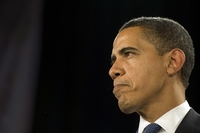 Barack Obama likes to portray himself as a post-partisan politician, someone who reaches beyond party. So, it was a blow to him to have to pass the stimulus without a single Republican vote in the House and only three Republican votes in the Senate. His cabinet doesn’t look particularly bi-partisan either. Robert Gates is a hold-over from the Bush administration but he is not even a registered Republican meaning that the only Republican in the Cabinet is the Transportation Secretary Ray La Hood: Bush also chose transportation for the one member of the other party in his Cabinet, Norm Mineta.
Barack Obama likes to portray himself as a post-partisan politician, someone who reaches beyond party. So, it was a blow to him to have to pass the stimulus without a single Republican vote in the House and only three Republican votes in the Senate. His cabinet doesn’t look particularly bi-partisan either. Robert Gates is a hold-over from the Bush administration but he is not even a registered Republican meaning that the only Republican in the Cabinet is the Transportation Secretary Ray La Hood: Bush also chose transportation for the one member of the other party in his Cabinet, Norm Mineta.
In the New Yorker, though, Hendrik Hertzberg argues that as long as Obama appears to be trying to reach out to Republicans, he wins when they don’t co-operate:
If true, this would certainly suit Obama. As the McCain campaign used to (rightly) point out, Obama’s bi-partisan reputation is built more around his rhetoric and his manners than any actual breaks with his own party that he has been prepared to make to pass legislation.“Fifty years ago, the civil-rights movement understood that nonviolence can be an effective weapon even if—or especially if—the other side refuses to follow suit. Obama has a similarly tough-minded understanding of the political uses of bipartisanship, which, even if it fails as a tactic for compromise, can succeed as a tonal strategy: once the other side makes itself appear intransigently, destructively partisan, the game is half won. Obama is learning to throw the ball harder. But it’s not Rovian hardball he’s playing. More like Gandhian hardball.”
But there are consequences of the stimulus having been passed on a pretty much party line vote. It means that Obama and Democrats—for good or ill—own the stimulus. It also means that Obama is going to be pretty much beholden to Democratic votes to pass health-care reform which he indicated on Friday would be his first non-economic legislative priority. This will result in a bill that is to the left of the political spectrum and thus harder to sell to centrist voters.
Hat Tip: Ben Smith







Comments